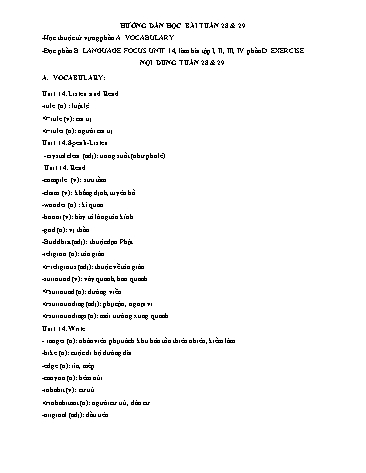Giáo án ôn tập Tiếng Anh Lớp 8 - Tuần 28+29
Bạn đang xem tài liệu "Giáo án ôn tập Tiếng Anh Lớp 8 - Tuần 28+29", để tải tài liệu gốc về máy hãy click vào nút Download ở trên.
Tóm tắt nội dung tài liệu: Giáo án ôn tập Tiếng Anh Lớp 8 - Tuần 28+29

HƯỚNG DẪN HỌC BÀI TUẦN 28 & 29 -Học thuộc từ vựng phần A. VOCABULARY -Đọc phần B. LANGUAGE FOCUS UNIT 14, làm bài tập I, II, III, IV phần D. EXERCISE NỘI DUNG TUẦN 28 & 29 A. VOCABULARY: Unit 14. Listen and Read -rule (n) : luật lệ rule (v): cai trị ruler (n): người cai trị Unit 14. Speak-Listen -crystal clear (adj): trong suốt (như pha lê) Unit 14. Read -compile (v): sưu tầm -claim (v): khẳng định, tuyên bố -wonder (n) : kì quan -honor (v): bày tỏ lòng tôn kính -god (n): vị thần -Buddhist (adj): thuộc đạo Phật -religion (n): tôn giáo religious (adj): thuộc về tôn giáo -surround (v): vây quanh, bao quanh surround (n): đường viền surrounding (adj): phụ cận, ngoại vi surroundings (n): môi trường xung quanh Unit 14. Write - ranger (n): nhân viên phụ trách khu bảo tồn thiên nhiên, kiểm lâm -hike (n): cuộc đi bộ đường dài -edge (n): rìa, mép -canyon (n): hẻm núi -inhabit (v): cư trú inhabitant (n): người cư trú, dân cư -original (adj): đầu tiên Modals: Động Someone can/ must/ may/ The report can/ must/ may/ từ khiếm should write the report. should be written khuyết Someone ought to write the The report ought to be report written Have to/ Had Someone has to/ had to write The report has to/ had to be to the report written Note: Nếu chủ ngữ của câu chủ động là : somebody, someone, people, I, You, He, She, We, They ...thì khi chuyển sang câu bị động, chúng ta không cần dùng “by +object” II. Reported speech: Yes-No question (Tường thuật câu hỏi Yes-No) a. Phân biệt câu hỏi Yes-No: Câu hỏi Yes-No là câu hỏi có câu trả lời là “Yes” hoặc “No” Ex: Do you speak English? –Yes, I do. b. Cách tường thuật câu hỏi Yes- No 1. Bắt đầu câu tường thuật bằng : (He) asked (me) hoặc (He) wondered hoặc (He) wanted to know 2. Bỏ dấu chấm hỏi và dấu ngoặc kép khi tường thuật 3. Thay đổi đại từ, tính từ sở hữu cho phù hợp 4. Thay đổi một số cách nói thời gian, nơi chốn Direct Reported Today That day Tonight That night Now Then Tomorrow The next day/ the following day Next (week) The next (week)/ the following (week) This/ these That/ those Here There 5. Thay đổi thì từ câu hỏi trực tiếp sang câu hỏi tường thuật Direct Reported Present simple Past simple “Does she live in Hanoi?” he asked He asked (me) if/ whether she lived in 2. Những động từ sau đây có thể theo sau bằng V-ing hoặc To-infinitive nhưng cho ý nghĩa khác nhau: Stop doing : dừng làm gì Stop to do : dừng để làm việc gì (You are doing something and then you stop it) (You stop something in order to do something Ex: I stop smoking two years ago. else) Ex : Geogre worked for hours, so he stopped to smoke a cigarette. Remember/ forget doing : nhớ/ quên đã làm gì Remember/ forget to do: nhớ/ quên sẽ phải làm (You did something in the past, and later you gì remember or forget it.) (You remember or forget what you have to do) Ex : Ex: -Don’t forget to post my letter on the way to -I remember meeting that man, but not exactly your office. where. -I’m sure you didn’t remember to lock the -She will never forget seeing the Queen. door. Here’s the key. Try doing: thử làm gì Try to do: cố gắng làm gì (do something as an experiment) (make an effort to do something) Ex: You should try unlocking the door with Ex: Sally is trying to find a job. this key. Need doing: cần được làm gì Need to do: cần làm gì (It needs to be done) (It’s necessary for somebody to do something) Ex: Your hair is too long. It needs cutting Ex: Your toothache is getting worse. You need to see the dentist. D. EXERCISE: I. Write complete sentences, using the verbs in the past passive form Ex: Eiffel Tower/ design/ Alexandre Gustave Eiffel/ 1889 Eiffel Tower was designed by Alexandre Gustave Eiffel in 1889. 1. Angkor Wat/ build / the early 12th century. 2. Golden Gate Bridge/ open/ 1937. 3. Grand Canyon/ excavate/ the Colorado River. 4. The faces of four American presidents/ carve/ Gutzon Borglum/ 1927 to 1941. 5. Empire State Building/ complete/ 1931. B: Next month. 9. A: How much money should we spend on the Christmas present? B: I’ve no idea....on it. IV. Complete the passage. Use either the to-infinitive or the bare infinitive form of the verbs in brackets. Nhi and her parents are visiting Hoi An and My Son. They are staying at a hotel near Cua Dai. Early this morning, Nhi decided (0) to go (go) for a run. She left the hotel and started (1) ..(jog) in the direction of Cua Dai beach. She thought she might (2) ..(go) along the beach for 20 minutes before heading for the hotel. Unfortunately, after 10 minutes, dark clouds began (3) ..(gather) and it started (4) ..(rain). Nhi tried (5) ..(reach) a shelter, but within a few seconds she was completely wet. So she decided (6) ..(continue) her run because she couldn’t (7) ..(get) wetter!
File đính kèm:
 giao_an_on_tap_tieng_anh_lop_8_tuan_2829.doc
giao_an_on_tap_tieng_anh_lop_8_tuan_2829.doc